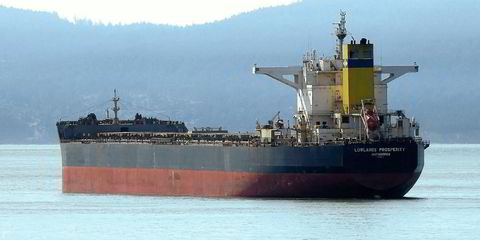The UK is looking to turn around the collapse of its shipping register ahead of Brexit with plans to reform its tonnage tax system after leaving the European Union.
But TradeWinds understands the proposals have created controversy within the UK shipping community, with some calling the timing of their submission "naive" and "risky", especially with negotiations of a UK-EU trade deal at such a critical point.
The UK's tonnage tax regime has proven popular with shipping companies but the same cannot be said for its ship registry, which has seen a 33% fall in registered tonnage since 2018.
A new proposal developed by the UK Maritime & Coastguard Agency submitted to the UK Department for Transport and ministers aims to bridge this gap.
Plans to expand the register include extending the scope of the UK tonnage tax regime by including oil rigs, which are not considered to be ships under the EU rules, the Financial Times reported on Wednesday.
The proposals being put to ministers could also include a £30m government-funded scheme to train cadets for shipping companies.
It is not clear at this stage whether this funding would coexist with or would supersede the existing obligation under the UK tonnage tax, in which companies must commit to providing training for UK cadets.
The UK regime is approved by the European Commission as state aid, which means the nation will not have to abide by European rules after it leaves the EU on 1 January.
Industry reaction

Bob Sanguinetti, chief executive of the UK Chamber of Shipping, which has overseen a review of the tonnage tax regime, told Sky News on Wednesday that leaving the EU could create "opportunities" for the UK through amendments.
"As we leave the EU, perhaps there'll be a certain amount of relaxation of those [state aid] rules, which will create opportunities for the UK to come up with a more attractive tonnage tax scheme," he told the broadcaster.
"I think there will be more flexibility for the UK in the shipping sector, as well as in other industries, to be able to create a more dynamic and a more business-friendly environment to attract more business, more companies and generate more jobs and more wealth in the UK," Sanguinetti said.
Ben Murray, director of promotional body Maritime UK, and Jos Standerwick, chief executive of trade body Maritime London, told TradeWinds the proposals are merely "blue-sky thinking" at this early stage.
Any reductions to the tonnage tax's cadet training commitment will likely be met with resistance from trade unions, but Nautilus International's general secretary Mark Dickinson told TradeWinds his union is working on it.
"It was in our charter for jobs [launched 2016] that we believe the Tonnage Tax needs reviewing and will work with all those involved on any proposals that are made," he said.
Shipping union the RMT responded by claiming that shipowners have benefited from subsidies worth £2.165bn since the tonnage tax scheme was introduced in the early 2000s, but the number of British ratings has flatlined and only 75 have been trained in the period.
RMT general secretary, Mick Cash said the union agreed that major reform is needed to secure a better deal for British seafarers, but added: "It would be nice to be consulted about these proposals, rather than reading about them."
The UK's tonnage tax regime, which does not include a flag requirement, has proven to be popular with shipping companies.
But some shipowners registered under the UK tonnage tax would like to see a more Singapore-style "one-stop shop" approach, according to a 2018 review conducted by the UK Chamber of Shipping, UK Department for Transport, HM Treasury, HM Revenue & Customs and the UK Ship Register.
Overall, 90% of respondents rated the UK’s scheme either "good" or "very good".
Ups and downs
Tonnage tax has been a huge generator of revenue and has boosted the UK-owned fleet by an average 5.1% year-on-year growth since its introduction in 2000, although a decline has been seen since 2011.
In 2017, consultancy CEBR estimated the value of tonnage tax to the UK economy was about £3.1bn in 2015.
Tonnage registered under Britain’s Red Ensign has fallen by more than one-third in the last two years to a level of 10.4m gt in March.
Brexit has derailed plans which were unveiled in 2017 to double the size of the UK flag within five years.
French liner giant CMA CGM was the biggest group to take its UK-flagged fleet out due to Brexit uncertainty.
Prior to the UK referendum on leaving the EU in 2016, it had 49 ships under the British register.










